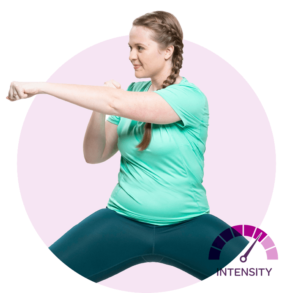Unusually tired after your workout? It might be time to check your thyroid.
Written by Paloma Health
Thyroid conditions are surprisingly common in the United States. An estimated 20 million Americans have thyroid disorders, and many without even knowing it. Thyroid diseases cause a whole host of symptoms, many of which slide under the radar of other conditions or are assumed to be a side effect of our busy world.
One of the most common symptoms is constant fatigue, and this can be especially apparent after physical exercise. If you find yourself exhausted after a workout, it may signify something amiss with your thyroid.
What is the thyroid gland?
The thyroid is a small but mighty organ that lives at the nape of your neck and regulates the body’s metabolism. It takes cues from the pituitary gland in the brain on how much thyroid hormone it should be producing and distributing throughout the body.
These thyroid hormones help regulate your metabolism, growth, and development. More specifically, they communicate to each cell how much energy to use and what type of energy is available.
Because thyroid hormones have receptors on every cell in the body, every system can be affected by changes in thyroid hormone concentration. Regrettably, this is why thyroid conditions can be so difficult to diagnose—because they can cause so many different problems in various organ systems.
Hypothyroidism explained
The most common thyroid disorder is hypothyroidism, a condition in which the thyroid does not produce enough thyroid hormone. Without sufficient levels of thyroid hormone in the body, every organ system experiences a general slowing. Common symptoms of hypothyroidism include:
- Fatigue and lethargy
- Depression
- Slowed thoughts and movements
- Muscle aches and pains
- Constipation
- Cold intolerance
- Thinning hair, dry skin, and brittle nails
- Irregular menstrual periods
Hypothyroidism often comes on in women in their midlife, right around the time of perimenopause and menopause. So, for women who are currently in menopause or postmenopausal, you may find overlap or a compounding effect in some of the symptoms.
Hypothyroidism has several causes, the most common of which is an autoimmune condition called Hashimoto’s thyroiditis, where the immune system mistakenly attacks the thyroid gland. With the constant presence of antibodies around the thyroid, the gland becomes suppressed and is eventually unable to function because of chronic inflammation.
Why hypothyroidism may be the culprit behind workout fatigue
It can be hard to determine if you have hypothyroidism. However, a telltale sign that it might be time for a thyroid blood test may be that you are exhausted after a workout and are slow to recover.
It’s normal to feel minor soreness after a workout, but there’s a clear difference between what is healthy and what may be harmful. Thyroid hormones help your cells utilize energy, so it can be tough to recover as your body has to work harder than it usually would during exercise.
There is a delicate balance to exercising with hypothyroidism. Too little, and you miss the benefits. Too much, and you deplete your already precious thyroid hormones more quickly. Building muscle and strength without overdoing it can help you get your energy back and lose weight.
You may feel great immediately after a long, sweaty workout, but if you hit a wall soon afterward, it may be a sign that your body is struggling to recover. Then, your thyroid isn’t able to properly regulate your body’s most necessary functions.
You may know this cycle all too well of beginning an exercise routine, abandoning said exercise routine, gaining weight, feeling exhausted, getting frustrated, rinse and repeat. Even just the thought of exercising can feel overwhelming. Curves and MyCurves on Demand have a vast array of classes ranging from lower to higher intensity. Those with concerns would benefit best from the lower to moderate workouts
Keep in mind that the thyroid also helps regulate your heart rate, blood pressure, and body temperature. Thus, when there is not enough thyroid hormone, your body has to find other ways to self-regulate.
How to test if you have a thyroid condition
If you suspect something is amiss with your thyroid, the first step is to test it with a thyroid blood test. You can use an at-home thyroid blood test to measure the following markers:
- TSH (thyroid-stimulating hormone)
- Free T4
- Free T3
- TPO antibodies (which help detect autoimmune disease in the thyroid)
Telemedicine makes having your blood checked much more accessible than your doctor putting in a requisition before you head to the lab. Now, you can order an at-home thyroid test kit from Paloma Health that checks for hyperthyroidism (too much thyroid hormone), hypothyroidism, and Hashimoto’s disease.
Results take five business days and help you determine if you need further evaluation from a health care provider. A thyroid doctor can help you interpret your lab values and decide what steps to take.
Staying active with a thyroid condition
We know that having an underactive thyroid can be challenging to live with, especially when you want an active, healthy lifestyle. But, there are proactive steps you can take to increase your energy levels, even when you are regularly exercising.
Take your thyroid medication
People with hypothyroidism need lifelong thyroid replacement medication to help increase their low levels of thyroid hormones. Taking your medicine every day is one of the best ways to maintain your energy.
Get plenty of sleep
Everyone needs to get sufficient sleep each night. However, it is crucial for people with thyroid conditions, as it gives your endocrine glands a chance to recover. Not getting enough sleep can also exacerbate inflammation, which can worsen Hashimoto’s.
Support your thyroid through diet
Eating low inflammatory foods and nutrient-dense foods can help give your thyroid what it needs to function. Also, foods packed with energy can help support your cells as well, such as food high in protein and healthy fats like avocados, fatty fish, nuts and seeds, and pasture-raised animals.
Cut back on caffeine
When you hit a slump, it’s tempting to reach for a caffeinated beverage like coffee or an energy drink to help you feel more energized. However, caffeine can interfere with thyroid medication absorption. So, drinking too much caffeine can have the opposite effect you desire and make you more tired.
Keep Exercising
Exercise is still crucially important, but making adjustments to your exercise routine can be helpful in dealing with the crash that comes after a workout. Workouts like Curves and MyCurves On Demand offer a selection of workouts that are safe for your thyroid, get your body moving, and leave you feeling great.
To find out more about how you can make informed lifestyle and health choices, visit our blog under the ‘Live’ category! You can also learn more about how the ‘Curves Circuit’ can benefit your lifestyle here.
About Paloma Health
Paloma Health is the first online medical practice focused exclusively on testing and treating hypothyroidism. The company offers access to at-home thyroid tests, virtual consultations with thyroid doctors and nutritionists, and prescription and supplement management for an integrated health experience.








